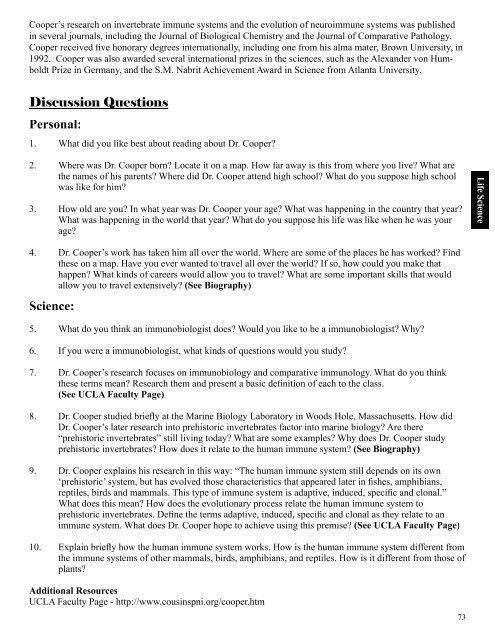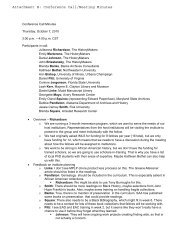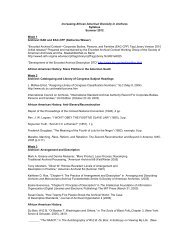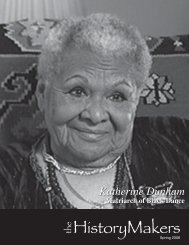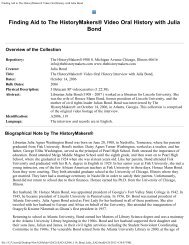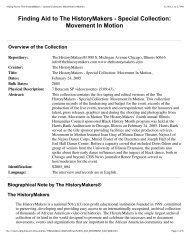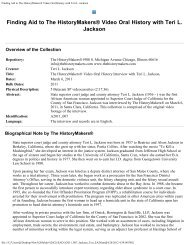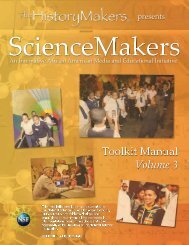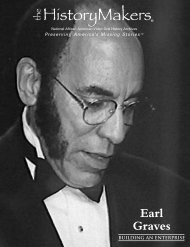ScienceMakers Toolkit Manual - The History Makers
ScienceMakers Toolkit Manual - The History Makers
ScienceMakers Toolkit Manual - The History Makers
Create successful ePaper yourself
Turn your PDF publications into a flip-book with our unique Google optimized e-Paper software.
Cooper’s research on invertebrate immune systems and the evolution of neuroimmune systems was published<br />
in several journals, including the Journal of Biological Chemistry and the Journal of Comparative Pathology.<br />
Cooper received fi ve honorary degrees internationally, including one from his alma mater, Brown University, in<br />
1992. Cooper was also awarded several international prizes in the sciences, such as the Alexander von Humboldt<br />
Prize in Germany, and the S.M. Nabrit Achievement Award in Science from Atlanta University.<br />
Discussion Questions<br />
Personal:<br />
1. What did you like best about reading about Dr. Cooper?<br />
2. Where was Dr. Cooper born? Locate it on a map. How far away is this from where you live? What are<br />
the names of his parents? Where did Dr. Cooper attend high school? What do you suppose high school<br />
was like for him?<br />
3. How old are you? In what year was Dr. Cooper your age? What was happening in the country that year?<br />
What was happening in the world that year? What do you suppose his life was like when he was your<br />
age?<br />
4. Dr. Cooper’s work has taken him all over the world. Where are some of the places he has worked? Find<br />
these on a map. Have you ever wanted to travel all over the world? If so, how could you make that<br />
happen? What kinds of careers would allow you to travel? What are some important skills that would<br />
allow you to travel extensively? (See Biography)<br />
Science:<br />
5. What do you think an immunobiologist does? Would you like to be a immunobiologist? Why?<br />
6. If you were a immunobiologist, what kinds of questions would you study?<br />
7. Dr. Cooper’s research focuses on immunobiology and comparative immunology. What do you think<br />
these terms mean? Research them and present a basic defi nition of each to the class.<br />
(See UCLA Faculty Page)<br />
8. Dr. Cooper studied briefl y at the Marine Biology Laboratory in Woods Hole, Massachusetts. How did<br />
Dr. Cooper’s later research into prehistoric invertebrates factor into marine biology? Are there<br />
“prehistoric invertebrates” still living today? What are some examples? Why does Dr. Cooper study<br />
prehistoric invertebrates? How does it relate to the human immune system? (See Biography)<br />
9. Dr. Cooper explains his research in this way: “<strong>The</strong> human immune system still depends on its own<br />
‘prehistoric’ system, but has evolved those characteristics that appeared later in fi shes, amphibians,<br />
reptiles, birds and mammals. This type of immune system is adaptive, induced, specifi c and clonal.”<br />
What does this mean? How does the evolutionary process relate the human immune system to<br />
prehistoric invertebrates. Defi ne the terms adaptive, induced, specifi c and clonal as they relate to an<br />
immune system. What does Dr. Cooper hope to achieve using this premise? (See UCLA Faculty Page)<br />
10. Explain briefl y how the human immune system works. How is the human immune system different from<br />
the immune systems of other mammals, birds, amphibians, and reptiles. How is it different from those of<br />
plants?<br />
Additional Resources<br />
UCLA Faculty Page - http://www.cousinspni.org/cooper.htm<br />
73<br />
Life Science


